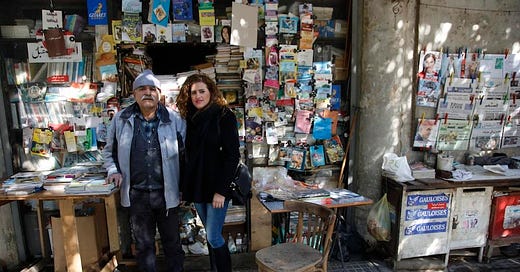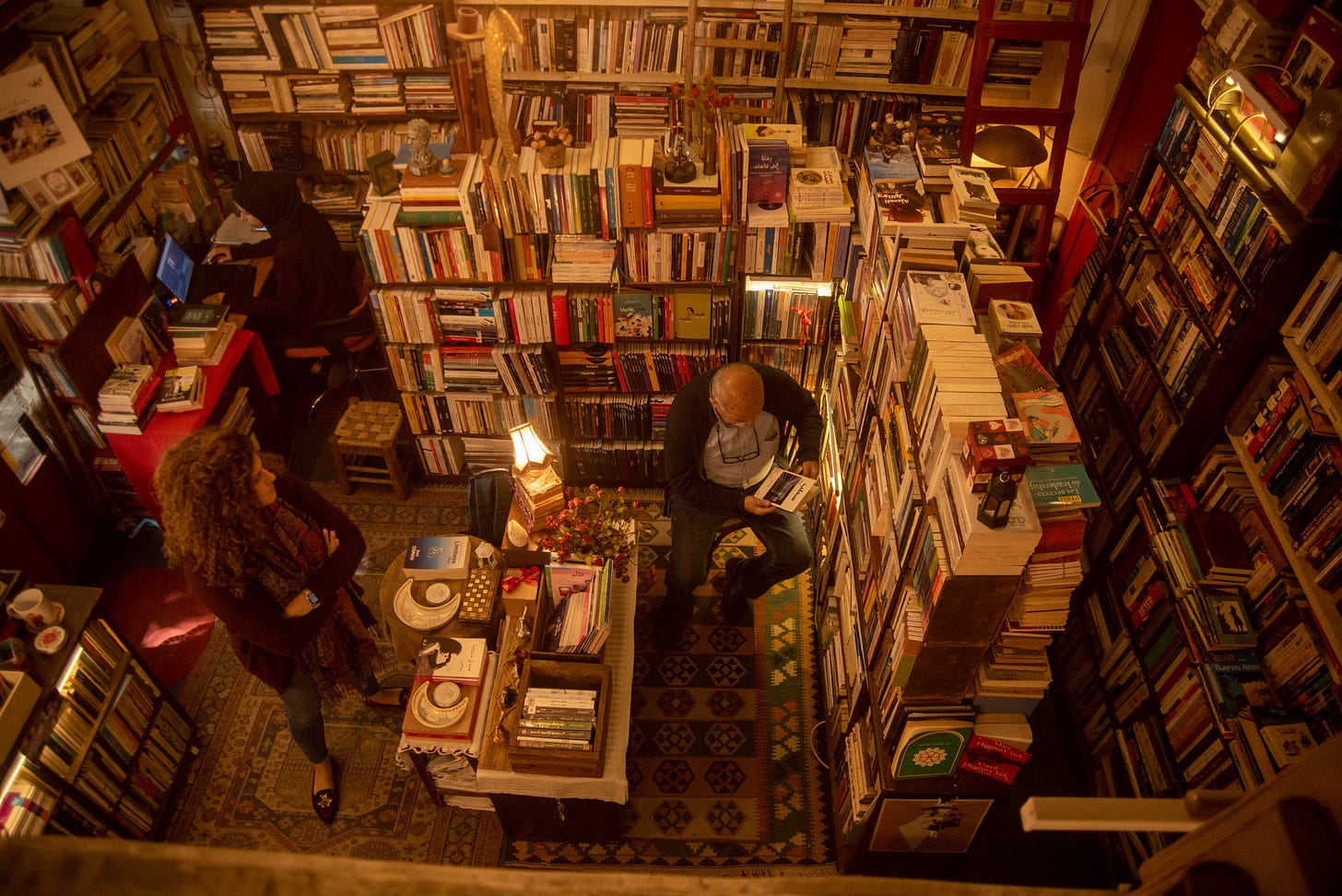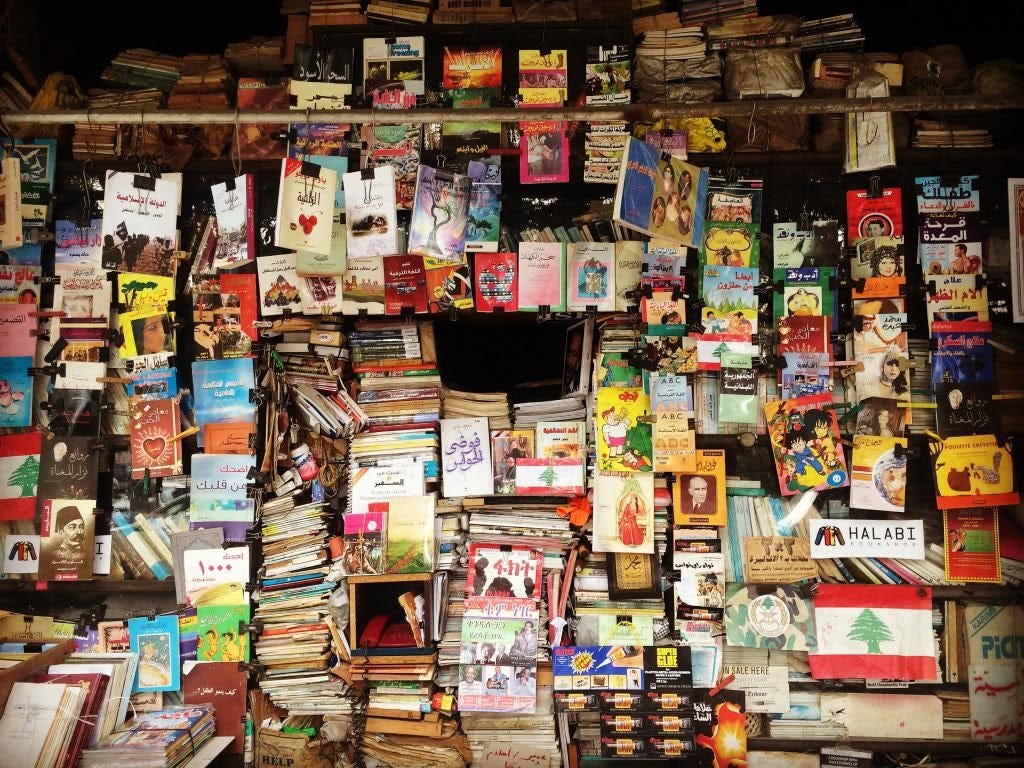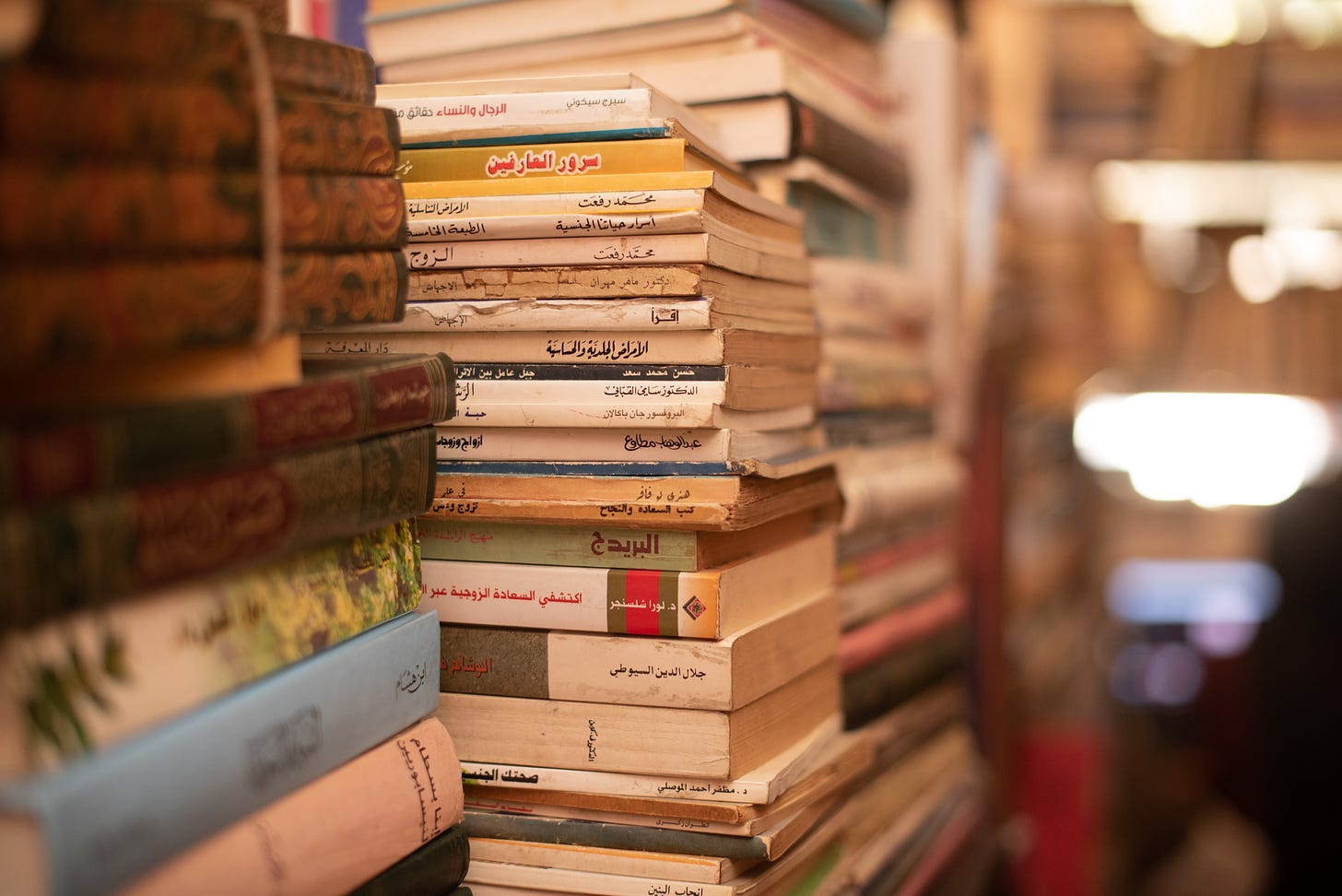Reviving a Legacy: The Renaissance of Halabi Bookshop
A combination of business acumen and stubborn determination drove Lana Halabi to salvage a shuttered family bookshop and transform it into a cultural institution
It will be difficult for the Halabi family to leave the building on Jalloul Street in Kaskas Beirut. It was here, in 1958, that Hussein Halabi started a small grocery store that would survive war, economic crises, and political turmoil to become one of Lebanon’s leading bookshops. These days, the name is well-known in Lebanon’s cultural scene, but for a long time, the tiny store was inaccessible. Its entrance was blocked by the sheer volume of unsold books packed into a 27-square-meter space.
This is what confronted Hussein Halabi’s granddaughter Lana Halabi when she decided to re-launch the shop in 2016. In an age where independent bookstores struggle against internet giants, friends and colleagues said it was foolhardy to invest in a neighborhood book business. But nine years after quitting her job to revive Halabi Bookshop, Lana has proved the naysayers wrong. Now, the Halabi name is widely known. “We get a lot of messages from the Lebanese diaspora saying how proud they feel. It’s really heart-warming,” she says.
The journey has been turbulent, even for Lebanon, where the past five years have brought financial collapse, pandemic lockdowns, the Beirut Port blast, political crisis, and the war in Gaza. That’s before factoring in the emotional baggage that come with taking over a family business. “If I had decided to start a bookshop from scratch, it would have been 50 percent less hassle,” Lana says. Yet Halabi has thrived, becoming a community hub and cultural icon that harnesses the power of the written word to bring people from across the country together in difficult times.
Now, the business is growing and needs more space. A grant from Ideas Beyond Borders has helped make this happen, funding a new warehouse to support the bookshop operations, store their stock, and fulfill orders for their upcoming E-commerce website.
For Lana, it’s the culmination of a decade’s work. “I have been dreaming about this growth for so long, and now it’s here,” she says.
Looking around the little shop, where books are stacked on every surface, and shoppers settle down to read in pools of lamplight, it feels like home. But Lana has always been business-minded, which is why she was able to salvage the bookshop in a climate that has forced many other businesses to close. So, she will relinquish the old site, with its cherished memories and family history, and find a new premises to accommodate the evolving vision for Halabi Bookshop, with a coffeeshop and bakery on-site, space for families with children, and opportunities to host larger cultural events.
Learning to love books
Abdullah Halabi wasn’t always a reader. As a young man, he traveled frequently, ferrying currency between London and Washington for a Jordanian bank in the 1980s. Exploring these foreign cities, Abdullah browsed the bookshops and noticed people reading on the metro and at bus stops in the street. His boss at the bank had a large private library and would often ask him to source books. Inspired, he began to read more. When his father Hussein Halabi fell sick, he returned to take over the family grocery store in Beirut and decided to turn it into a bookshop.
It was 1991, and the civil war that raged in Lebanon from 1975 had just ended. People were starting to spend money on books again. So, Abdullah reduced his grocery orders and started getting more books, buying up collections, and sourcing works on request from buyers. By then, he was reading widely—histories of Lebanon, biographies, and novels. “As a guardian of books, you have to read a lot of topics so you can help people choose what book is best for them.” It’s a role he now shares with his daughter Lana since she took over the family business in 2014.
A lot of Lana’s time is now spent curating their collection, catering to different trends and tastes. Halabi Bookshop releases recommendations, which Lana compiles, researching the best books according to certain themes. The latest is parenting advice. “Parents need guidance, and this is the role of bookshops, to curate books. A lot of people trust us to start their reading journey,” she says.
A cultural community
When she’s not at the bookshop, or representing it at events, Lana takes her daughter to the park up the street. Horsh Beirut is the largest green space in the city, a verdant pocket of tree-lined pathways and grassy hillsides in the heart of a busy capital. “They call it the lung of Beirut. It’s beautiful,” she says.
Horsh Beirut used to be larger, spilling into the streets of Kaskas, which were once lined with trees. Back then, the area was a hub for creatives in the city, attracting actors, artists, and writers alongside visitors from across the Arab world. Among them were the director and writer Mohamed Salman, journalist Riad Taha and Hassan Alaa Eddin, the Lebanese actor and singer known as Shoushou, who lived in the same building as the Halabi family. “A lot of prominent people made this neighborhood their home,” Abdullah says.
A lot has changed in Kaskas since those days. Over the years, demographics shifted, and the calm, leafy streets became noisy and crowded. Fewer people came to Kaskas, and the artistic ambiance drifted away. But Halabi Bookshop has given them a reason to come back, drawing creatives, intellectuals, and everyday readers from across the country to participate in the renaissance of this cultural gem.
“We still have of people from all over Lebanon visiting Halabi because we re-created that kind of atmosphere,” Lana says. “People of different backgrounds tell me they are proud to break those barriers and come to an area they wouldn’t normally visit.” It is one of the many unexpected rewards of reviving the bookshop, which has proved to be much more than a local business. “We are serving the country as a whole, not just the neighborhood. And the international community too—it’s even become a tourist attraction,” she says.
Honoring the collection
This makes the prospect of moving easier, because it’s a role they will carry with them to the new Halabi Bookshop site. During difficult times, like the Covid lockdowns, when the shop was forced to close, or the currency crash, which destroyed many small businesses across Lebanon, messages of support from the wider community kept Lana going. “People who have never been to Lebanon write and say they hope to come and visit Halabi. There are lots of beautiful messages,” she says.
Many of the messages are on social media, where Halabi has an active network. This is where Lana took the first tentative steps to transform the business in 2014, building a following to support her plans, which initially focused on organizing and selling her father’s huge collection. Over time, it had grown to around 100,000 books and magazines, but even when he ran out of space, Abdullah Halabi carried on collecting. “He would buy them from people who moved abroad, or from the children of old people who passed away,” Lana says.
The collection included old and rare books covering a huge span of subjects in Arabic, English, French, Russian, Dutch, German, and Italian. There were magazines too, stretching back more than half a century—old copies of The Economist, National Geographic, and Newsweek, among others, chronicling global affairs across the decades. Several times he offered the books to libraries or cultural NGOs, but there was never a reply. “At times, I was willing to give away all the books, but no one wanted to invest in a social, cultural project,” he says.
As floor space disappeared under piles of books, he stored new purchases at home, cramming them into every corner and stacking them on surfaces, to the frustration of his wife. Some ended up on the roof, where they got damaged. Others were kept in a rented site and later stolen. As the new millennium dawned, sales dwindled and the bookshop became harder and harder to access. No one knew what to do with the small space that heaved with books.
So, the collection stayed in the small shop and the family home, gathering dust and provoking Lana’s mother, who would berate Abdullah for spending so much on books. “She got frustrated, my mother. During the years he was collecting books, they weren’t profitable at all, and our financial status was declining.” By the time Lana decided to revive the business, the shop had been inaccessible for 15 years. “It started as a personal thing—I wanted my father to know that all the things he had collected were of value.”
She also wanted to create a new source of income for her parents so they could enjoy a better lifestyle as they grew older. Lana had built a successful career in fashion and retail. If she could sell clothes and shoes, surely she could sell books too? She began by building a presence online to engage people with Halabi’s journey. Weekends were spent at street fairs and any event where she could sell stock, collaborating with similar initiatives in Lebanon to build their network. Gradually, she carved out space for Halabi Bookshop on the cultural scene.
Her life at that time was a blur, but she knew how important it was to familiarise people with the Halabi name. The 59th edition of the Beirut Arabic International Bookfair—the oldest book fair in the Arab world—was due to begin in November 2015 and all the serious players in the industry would be there. Lana was still working full-time and considered taking annual leave to attend the two-week fair. “That’s when I thought, ‘khalas’ (enough), I need to quit my job for this mission.”
A new bookshop
Four months later, Lana stood in front of the small shop that had sustained her family for so many years. The books had disappeared under the dust of several decades, and she wondered, briefly, whether to go ahead. As children, her mother used to take them all down to tidy the shop on Sundays. They still had a big fridge from the days when it was a grocery, but even that was stuffed with newspapers and magazines. The task seemed monumental.
“There was this big mental obstacle towards re-opening the shop,” she says. Lana’s brother agreed to put up some money, but it was a while before her family understood her vision for the tattered little store or shared her faith in its future.
Lebanon has long been a hub for publishing in the Middle East, helped by comparatively relaxed censorship rules, a prolific creative community, and superior printing facilities. Ahead of other Arab countries in tolerating free speech, it was known as the Switzerland of the Middle East, a place for Arabic authors and poets to publish their work. By the time Lana took over, the scene had changed, and two or three big book chains dominated the sector—the rest were small businesses like Halabi run by book collectors, and many were struggling to survive.
In 2017, their first fully operational year, several prominent old bookshops in Lebanon closed. Yet elsewhere, independent bookstores were re-emerging. “I read this article about how indie bookshops started coming back to life after 2015 in the US and UK. It was because neighborhoods needed community spaces,” Lana says. This was the vision she set about realizing—a community space that felt warm and inviting, somewhere safe and welcoming for people to read and discuss their favorite works. She chose a deep red shade for the woodwork and placed colorful rugs on the freshly polished floors. Then, after a six-month renovation project, she restocked the shelves.
Sales were strong from the start, so Lana reinvested the proceeds to diversify their stock. “I was bad at managing the cash flow, then I gradually learnt,” she says.
In 2017 they began to host events, including a traveling book club and storytelling sessions for children. Soon, Lana found herself crossing the country, hosting sessions in Tripoli, Saida, and the old Phoenician city of Sur. People would gather in public libraries, gardens, or sometimes a theatre space. “We used to collaborate with initiatives from civil society like ours that were having an impact,” she says. Back in Beirut, the space in front of the bookshop became a regular spot for storytelling, tea parties, and other cultural gatherings. Neighbors would bring cakes, and passersby would stop to listen. “It was a very warm environment,” Lana says.
News of their success rippled around the country as media outlets came to document the shop’s makeover. Two years went by quickly as the Halabi enterprise continued to grow. Still, they struggled financially. “We got a lot of support from the media—people were emotionally invested. But it was very hard for us to get any financing from the entrepreneurial ecosystem in Lebanon; they saw us as a traditional business,” she says. Then, the currency crisis hit in 2019, and six months later, the country went into lockdown as the COVID-19 pandemic spread around the world.
Weathering the crisis
As the streets fell silent and footfall slowed, Lana switched to survival mode. With the value of the Lebanese lira plummeting and protests gripping the country, sales dropped. “It was hard, all our accounts were collapsing, the devaluation really ruined everything, then came more difficulties like the Beirut blast.” By then, the bookshop was supporting the whole family. “I didn’t have the luxury to fail. I was responsible for my family, the pets, everything. I always had to find ways to go on and survive.”
She used the lull to digitize their stock, which turned out to be one of the best things she has done for the bookshop. Still, taking these decisions as a solopreneur has been hard, and at times lonely. During the currency crisis, when several staff members left, or when she fell pregnant and had to make sure everything could run without her, the hurdles felt insurmountable. “Now there is war on the southern border, and it’s very stressful. We don’t know how it could end. This is part of the resilience we grow as Lebanese—it’s traumatizing in a way but also made us stronger,” she says.
For Lana, success lies in accepting challenges. “Given everything we have passed through, I know I can conquer anything,” she says.
A new chapter
By 2023, Halabi Bookshop was back to running events, and in January this year, they relaunched the book club. The new warehouse space is operational and Lana is busy planning the next phase of expansion. Finally, a decade after she embarked on the project, the family business is growing. These days, it really is a family enterprise. Her mother is the assistant manager and runs the shop while Lana and her brother visit book fairs, host cultural events, and attend speaking engagements abroad.
Lana has been invited to speak at the Abu Dhabi International Bookfair, the Book Arsenal in Kyiv, and numerous events in Lebanon. Sharing her journey with others reminds her of what she has achieved and how far they have come. However, one opportunity always evaded her. For years, she struggled to secure funding to grow the business. “After the economy collapsed, the appetite for investment shifted, and funding for cultural projects dried up,” she says.
So, last year, she compiled the reasons their grant applications were rejected and addressed them one by one. She registered the business as a formal entity named Ficus SARL and put the whole enterprise in her name to manage legal affairs. She also formalized their employment structure and tidied their financial reports. It paid off. Last year, she had two breakthroughs—a microfinance investment loan and an Innovation Hub grant from Ideas Beyond Borders.
This, for Lana, is what makes running Halabi Bookshop so rewarding. The entrepreneur is a problem solver, she says, and finding ways to make the business thrive is a powerful validation. “It’s not about the money—there’s a limit to what you can make in this industry,” But the impact is limitless, and this is where her ambition leans. “The messages we get from our community are inspirational. They say we are bringing hope to Lebanon and that is what really drives me on.”
This article was written by Olivia Cuthbert.









Thank you Olivia for the thorough article, it was great coordinating with you while preparing this. It is indeed a sufficient sum up of my journey, it felt great to read it! So grateful for the IBB Innovation Hub Grant, it truly helped us realize our goals. 🙌🏻❤️